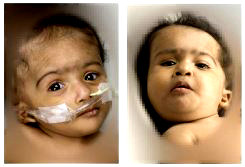One twin talking after successful separation in Australia
 Sydney - One of the Bangladeshi conjoined twins Australian surgeons separated this week is talking and cuddling her stand-in mother while the other is wiggling her fingers and soon will be woken from her induced coma.
Sydney - One of the Bangladeshi conjoined twins Australian surgeons separated this week is talking and cuddling her stand-in mother while the other is wiggling her fingers and soon will be woken from her induced coma.
Doctors at Melbourne's Royal Children's Hospital said Thursday that scans of 2-year-olds Krishna and Trishna showed no brain damage from the 31-hour operation.
Head of neurosurgery Wirginia Maixner declared the operation on the orphaned girls a success and predicted they would make a full recovery.
Maixner and fellow neurosurgeon Alison Wray told of their joy at the actual parting of the joined-at-the-head infants given no chance of survival without medical intervention.
"That was an amazing moment, I have to tell you," Maixner said at a press conference. "To have struggled so long, to have worked so hard for what was not just that day but for a whole two years of work, to be able to say, 'I think we've done it.'"
Head of surgery Ian Donnan paid tribute to Maixner and Wray: "I've only got one thing to say to them: 'girl power.'"
Plastic surgeon Andrew Greensmith, who was in charge of crafting new skulls from bone fragments and plastic parts, said computer modeling of the girls' heads gave the team a crucial advantage.
"We could actually effectively almost simulate surgery to give Wirginia and her team an idea of the blood vessel arrangement," Greensmith said. "I believe we couldn't have done it without that."
Going into the operation, doctors had estimated the chances of the orphan sisters coming out of the marathon procedure unscathed were only 25 per cent and that the odds of brain damage were even.
This year attempts in Britain and Bangladesh to separate twins failed, but an operation in Saudi Arabia on Egyptian brothers was successful.
In Singapore in 2003, 29-year-old Iranian twins Laleh and Ladan Bijani, who were also joined at the head, died of blood loss after 52 hours of surgery.
Krishna and Trishna, who turn three soon, were left in a Dhaka orphanage at birth and have spent the last two years in Australia.
Stand-in mother Moira Kelly, who brought the twins to Australia in 2007 and is their guardian, told of her emotion at being between Krishna and Trisha as they slept in separate beds.
"To see these two beautiful little people, two brave brave little girls ... and I'm in the middle of them," Kelly blubbered. "They are in two cots and I was standing in the middle of them, which is something I've never done before - it's amazing."
Dianne Kenny, head of psychology at Sydney University psychologist, said the twins would face enormous psychological challenges coming to terms with their independence and it was likely they would be kept close for the time being rather than coaxed into living separate lives.
"We could never grasp the enormity of the emotional adjustment that needs to occur," she said. "That process would be supported by having them physically and emotionally close to each other."
Professor Kenny said Krishna and Trishna would have to gain their balance and learn to walk but that their chances of doing so were good.
"Young children are extremely resilient and in a few weeks all of those deficits ... will rapidly recover and develop normally if their brains haven't been damaged by the surgery," she said. "Children are more malleable and adaptive - they can learn to cope with these kinds of things much more than older people." (dpa)